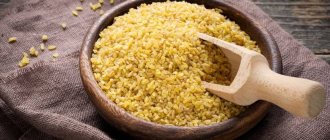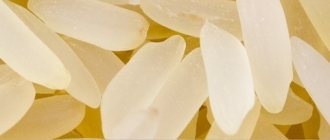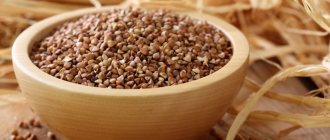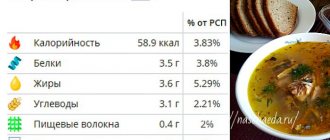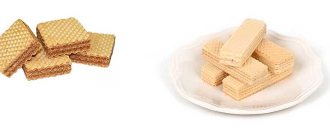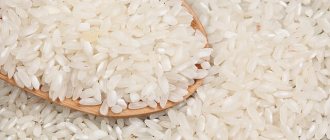What is bulgur?
Bulgur is a grain made from wheat harvested during milk maturity. The wheat is steamed, dried in the sun, cleared of bran (remnants of the shell) and crushed into small fractions. Externally, the resulting grits resemble corn; in Russia, barley grits can be called an analogue of bulgur, only, unlike the oriental product, it is not steamed, therefore, the taste is not so rich. It is thanks to steaming and drying that bulgur gets an unusual taste and aroma, reminiscent of a nut. Modern bulgur can have different degrees of grinding: fine grinding is used for baking bread, medium grinding is used for porridges and soups, coarse grinding is good for pilaf.
Bulgur is easy to prepare - you just need to fry it in a hot frying pan with the addition of butter or vegetable oil, then add water (the proportions depend on the desired consistency of the dish) and cook until tender. This grain does not need to be washed before or after cooking.
Bulgur is an excellent analogue to the usual rice, but unlike it, it does not boil and does not stick together.
The cereal can be used both as a side dish for meat dishes or as a component of pilaf, and as an independent dish - bulgur cutlets are nutritious and satisfying. This grain is added to soups and stews, stuffed with vegetables, and, of course, added to salads, the most famous and “ancient” of which is Tabbouleh salad. You can also use this product in preparing sweet dishes - it goes well with nuts and honey; it is not recommended to add dried fruits, as this can cause serious fermentation processes in the stomach. The sweets turn out incredibly tasty and healthy, although quite high in calories.
Calorie content of boiled bulgur
When many people hear the word “wheat,” they associate them with baked goods, which contain many “empty” calories that tend to turn into fat deposits.
Indeed, bulgur is quite high in calories - 100 grams of boiled cereal contains about 350 Kcal, and if we take into account that it is fried in oil before cooking, this figure may increase slightly.
But, unlike products made from refined wheat - bread made from premium flour, pasta made from refined flour, bulgur contains mostly complex carbohydrates, which take longer to digest, do not cause sudden spikes in blood sugar levels, and are not processed into fats. True, if you abuse this product and eat it in large portions several times a day, “baggage” in the form of extra pounds may appear. True, this applies not only to bulgur, but rather to absolutely all products, because overeating has never benefited anyone.
Examples of dietary recipes for first courses
For traditional Turkish soup you will need:
- 120 g. cereal;
- 1.5 liters of water;
- a teaspoon of turmeric;
- bulb;
- 2 tomatoes;
- salt.
To prepare, you need to wash and cut the vegetables as desired. The cereal is pre-soaked. 5 minutes after the start of cooking, add onions, then after another 2 minutes add tomatoes, after another three minutes add turmeric and salt. The dish is brought to readiness and left to brew.
Dietary dishes are prepared on the basis of Turkish soup. For example, to the above ingredients add 100 grams of lentils, two teaspoons of vegetable oil and fresh herbs. They begin to boil the lentils along with the cereal. Chopped onions are pre-fried in oil. Chopped herbs are added at the end of cooking.
The benefits and harms of bulgur
This product, so beloved in the East, however, like any other, in addition to its beneficial properties, also has some undesirable consequences of consumption. For the most part, this depends on the quantity in which the cereal is consumed, although there are other conditions. Let's start with the good news.
Benefits of bulgur
The value of bulgur lies in the fact that this grain contains almost the entire spectrum of vitamins and microelements vital for humans. These are primarily B vitamins (B1, B2, B3, B4, B5, B6, B9), vitamin K, E, PP, choline, beta-carotene. Microelements: iron, potassium, calcium, sodium, phosphorus, copper, selenium, zinc, manganese.
This cereal also contains ash substances, saturated fatty acids, saccharides and fiber. It’s worth talking about the latter in more detail, because this component brings invaluable benefits to the human body. In the east they say that a person’s health depends on the condition of his intestines, and it is thanks to fiber that the intestines are cleansed and get rid of toxins and various deposits that poison the entire body system. Fiber is something like a “broom” for the intestines, without which the proper functioning of this important organ is almost impossible.
B vitamins have a beneficial effect on the functioning of the nervous system, and they will be absorbed much easier than synthetic vitamin complexes from the pharmacy. A person who receives vitamins from this group is more resistant to stress, easily copes with life's troubles, and tolerates nervous tension easier than others. Mineral salts help restore metabolism, give vitality to skin and hair, and strengthen bones.
The nutritional properties of bulgur are indispensable for people in difficult professions, which are often accompanied by physical and mental stress. It will be useful to include this cereal in the diet of athletes. Bulgur is perfectly digestible, providing the body with energy for 5 hours in advance, is well absorbed, and gives the body all its beneficial substances.
Harm of bulgur
In principle, bulgur cannot harm a healthy person who does not adhere to any strict diet. The situation is different for those who are forced to eat a certain way.
First of all, people who want to lose weight need to eat this cereal very carefully. The fact is that bulgur is the record holder for the highest calorie content among grains common to Russian people. In addition to this, the recommended cooking method is frying first, which provides additional calories. On the other hand, nutritionists advise including this cereal in their diet even for people who are prone to obesity, the only condition is in small quantities.
Fiber, which is so beneficial for the intestines, can also have a negative effect on the body of an unhealthy person. Its use is not recommended for people suffering from diseases of the gastrointestinal tract, especially during their exacerbation. Therefore, for those who have ulcers, gastritis, or increased stomach acidity, it is better to refrain from consuming this cereal until recovery.
Examples of dietary recipes for main courses
To make the meatballs, boil 150 grams of bulgur. 200 grams of poultry meat are ground in a blender. The ingredients are mixed in a large container. Add 4 yolks and salt to them. The minced meat is used to make cutlets, which are baked in the oven or steamed.
For stuffed eggplants you will need: five vegetables, cut into two parts. The core is removed from the halves, and the edible pulp is finely chopped. The latter is mixed with chopped garlic, crushed nuts, three sour apples, five carrots. 100 grams of boiled bulgur is also added to the mixture. The minced meat is stewed in a frying pan for 5 minutes, then 100 grams of plums or other fruits are added to it to taste. The filling is simmered for another 10 minutes, then distributed among the eggplant halves. The dish is steamed for 20 minutes.
Contraindications to the use of bulgur
- As mentioned above, healthy people can eat bulgur without fear of harming the body. But those who have gastrointestinal diseases need to be extremely careful.
- There is one more serious contraindication, which applies to those people whose body is not able to digest gluten. Bulgur contains a lot of this substance, and for those who suffer from celiac disease (the inability of the digestive system to absorb the protein of certain grains), this cereal can be deadly. The whole danger of the situation is that some people do not even suspect that they have this disease. But if, after eating bulgur, weakness, drowsiness, flatulence, or diarrhea appear, this is a reason to consult a doctor and check the fact of normal absorption of gluten.
- Some people may be allergic to cereals; bulgur is also not suitable for them.
Examples of dietary recipes for cold dishes
For the salad, boil 0.5 liters of water and cool to 50–55 degrees. Two hundred grams of cereal are poured with liquid and begin to cook along with parsley. After 15 minutes, the water is drained. The cereal is transferred to a salad bowl and sprinkled with lemon juice. Chopped onions, mint, olive oil and fresh vegetables are added to the porridge according to preference.
For dietary pate you will need beans. The dry one is soaked overnight and boiled in the morning. Boil 50 grams of bulgur in 100 ml of boiling water for 10 minutes. The onion and a couple of cloves of garlic are peeled and finely chopped, then stewed. Place the ingredients in a blender, add yogurt, salt and lemon juice, and mix.
Can it be used for weight loss?
Bulgur for weight loss, reviews of which are massively positive, really has many dietary properties. Its chemical composition includes a number of compounds that promote weight loss and improve metabolism.
One of its biggest benefits is its high fiber content. One cup of cooked cereal contains 8 g of fiber. When you eat foods rich in fiber, it swells your body and slows down the rate at which food is digested and glucose and cholesterol are absorbed. Slow digestion allows you to feel fuller longer.
Bulgur also contains resistant starch. This substance was recently named nature's best fat burner because it remains in the digestive system without being digested or absorbed. Therefore, it induces a feeling of fullness without releasing glucose into the blood. This allows you to eat less food and significantly reduce your caloric intake.
According to nutritionists, adding just half a cup of a product rich in saturated starches to your daily menu can lower blood sugar levels and turn off hunger hormones.
The main properties of bulgur that promote weight loss are as follows:
| Properties of cereals | Impact on weight loss |
| Large number of fibers | Helps maintain blood sugar levels and also keeps you full for a long time. A medium portion of porridge for breakfast will keep you full until lunch. This helps you stop overeating and your calorie intake becomes lower than usual. It also helps support the digestive system, as fiber increases stool bulk and makes it easier to cleanse the body. |
| Low calorie content | 1 tbsp. cooked cereal has only 150 calories and 0.5 g of fat. By keeping you feeling full for a long time, bulgur helps create a calorie deficit. |
| Low glycemic index | It is slowly absorbed into the body, since sugars are not released immediately, and blood sugar levels rise gradually. This helps prevent overeating and sudden attacks of hunger. |
| High protein content | Proteins take longer to digest and this speeds up your metabolism and helps release weight-regulating hormones. In addition, they help reduce levels of the hunger hormone ghrelin. |
| Anti-inflammatory properties | Weight gain in some cases occurs due to inflammation. In order to fight it, you need to eat foods rich in antioxidants. Bulgur has significant anti-inflammatory properties, promoting weight loss. |
Bulgur for weight loss, reviews of which confirm its effectiveness, can be used in different ways. It is not at all necessary to eat cooked cereals in their pure form. You can prepare many delicious dietary dishes from it, including cereals, soups and salads. All this is recommended to be consumed throughout the day.
